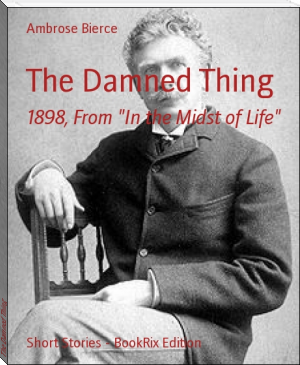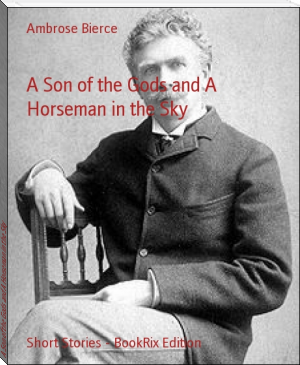Can Such Things Be? by Ambrose Bierce (popular books of all time .TXT) 📖

- Author: Ambrose Bierce
Book online «Can Such Things Be? by Ambrose Bierce (popular books of all time .TXT) 📖». Author Ambrose Bierce
Miss Harford arose, shuddering; the sun had sunk below the horizon, but it was not cold. There was not a breath of wind; there were no clouds in the sky, yet not a star was visible. A hurried tramping sounded on the deck; the captain, summoned from below, joined the first officer, who stood looking at the barometer. "Good God!" I heard him exclaim.
An hour later the form of Janette Harford, invisible in the darkness and spray, was torn from my grasp by the cruel vortex of the sinking ship, and I fainted in the cordage of the floating mast to which I had lashed myself.
It was by lamplight that I awoke. I lay in a berth amid the familiar surroundings of the stateroom of a steamer. On a couch opposite sat a man, half undressed for bed, reading a book. I recognized the face of my friend Gordon Doyle, whom I had met in Liverpool on the day of my embarkation, when he was himself about to sail on the steamer City of Prague, on which he had urged me to accompany him.
After some moments I now spoke his name. He simply said, "Well," and turned a leaf in his book without removing his eyes from the page.
"Doyle," I repeated, "did they save HER?"
He now deigned to look at me and smiled as if amused. He evidently thought me but half awake.
"Her? Whom do you mean?"
"Janette Harford."
His amusement turned to amazement; he stared at me fixedly, saying nothing.
"You will tell me after a while," I continued; "I suppose you will tell me after a while."
A moment later I asked: "What ship is this?"
Doyle stared again. "The steamer City of Prague, bound from Liverpool to New York, three weeks out with a broken shaft. Principal passenger, Mr. Gordon Doyle; ditto lunatic, Mr. William Jarrett. These two distinguished travelers embarked together, but they are about to part, it being the resolute intention of the former to pitch the latter overboard."
I sat bolt upright. "Do you mean to say that I have been for three weeks a passenger on this steamer?"
"Yes, pretty nearly; this is the 3d of July."
"Have I been ill?"
"Right as a trivet all the time, and punctual at your meals."
"My God! Doyle, there is some mystery here; do have the goodness to be serious. Was I not rescued from the wreck of the ship Morrow?"
Doyle changed color, and approaching me, laid his fingers on my wrist. A moment later, "What do you know of Janette Harford?" he asked very calmly.
"First tell me what YOU know of her?"
Mr. Doyle gazed at me for some moments as if thinking what to do, then seating himself again on the couch, said:
"Why should I not? I am engaged to marry Janette Harford, whom I met a year ago in London. Her family, one of the wealthiest in Devonshire, cut up rough about it, and we eloped--are eloping rather, for on the day that you and I walked to the landing stage to go aboard this steamer she and her faithful servant, a negress, passed us, driving to the ship Morrow. She would not consent to go in the same vessel with me, and it had been deemed best that she take a sailing vessel in order to avoid observation and lessen the risk of detection. I am now alarmed lest this cursed breaking of our machinery may detain us so long that the Morrow will get to New York before us, and the poor girl will not know where to go."
I lay still in my berth--so still I hardly breathed. But the subject was evidently not displeasing to Doyle, and after a short pause he resumed:
"By the way, she is only an adopted daughter of the Harfords. Her mother was killed at their place by being thrown from a horse while hunting, and her father, mad with grief, made away with himself the same day. No one ever claimed the child, and after a reasonable time they adopted her. She has grown up in the belief that she is their daughter."
"Doyle, what book are you reading?"
"Oh, it's called 'Denneker's Meditations.' It's a rum lot, Janette gave it to me; she happened to have two copies. Want to see it?"
He tossed me the volume, which opened as it fell. On one of the exposed pages was a marked passage:
"To sundry it is given to be drawn away, and to be apart from the body for a season; for, as concerning rills which would flow across each other the weaker is borne along by the stronger, so there be certain of kin whose paths intersecting, their souls do bear company, the while their bodies go fore-appointed ways, unknowing."
"She had--she has--a singular taste in reading," I managed to say, mastering my agitation.
"Yes. And now perhaps you will have the kindness to explain how you knew her name and that of the ship she sailed in."
"You talked of her in your sleep," I said.
A week later we were towed into the port of New York. But the Morrow was never heard from.
THE MIDDLE TOE OF THE RIGHT FOOT
I
It is well known that the old Manton house is haunted. In all the rural district near about, and even in the town of Marshall, a mile away, not one person of unbiased mind entertains a doubt of it; incredulity is confined to those opinionated persons who will be called "cranks" as soon as the useful word shall have penetrated the intellectual demesne of the Marshall Advance. The evidence that the house is haunted is of two kinds: the testimony of disinterested witnesses who have had ocular proof, and that of the house itself. The former may be disregarded and ruled out on any of the various grounds of objection which may be urged against it by the ingenious; but facts within the observation of all are material and controlling.
In the first place, the Manton house has been unoccupied by mortals for more than ten years, and with its outbuildings is slowly falling into decay--a circumstance which in itself the judicious will hardly venture to ignore. It stands a little way off the loneliest reach of the Marshall and Harriston road, in an opening which was once a farm and is still disfigured with strips of rotting fence and half covered with brambles overrunning a stony and sterile soil long unacquainted with the plow. The house itself is in tolerably good condition, though badly weather-stained and in dire need of attention from the glazier, the smaller male population of the region having attested in the manner of its kind its disapproval of dwelling without dwellers. It is two stories in height, nearly square, its front pierced by a single doorway flanked on each side by a window boarded up to the very top. Corresponding windows above, not protected, serve to admit light and rain to the rooms of the upper floor. Grass and weeds grow pretty rankly all about, and a few shade trees, somewhat the worse for wind, and leaning all in one direction, seem to be making a concerted effort to run away. In short, as the Marshall town humorist explained in the columns of the Advance, "the proposition that the Manton house is badly haunted is the only logical conclusion from the premises." The fact that in this dwelling Mr. Manton thought it expedient one night some ten years ago to rise and cut the throats of his wife and two small children, removing at once to another part of the country, has no doubt done its share in directing public attention to the fitness of the place for supernatural phenomena.
To this house, one summer evening, came four men in a wagon. Three of them promptly alighted, and the one who had been driving hitched the team to the only remaining post of what had been a fence. The fourth remained seated in the wagon. "Come," said one of his companions, approaching him, while the others moved away in the direction of the dwelling--"this is the place."
The man addressed did not move. "By God!" he said harshly, "this is a trick, and it looks to me as if you were in it."
"Perhaps I am," the other said, looking him straight in the face and speaking in a tone which had something of contempt in it. "You will remember, however, that the choice of place was with your own assent left to the other side. Of course if you are afraid of spooks--"
"I am afraid of nothing," the man interrupted with another oath, and sprang to the ground. The two then joined the others at the door, which one of them had already opened with some difficulty, caused by rust of lock and hinge. All entered. Inside it was dark, but the man who had unlocked the door produced a candle and matches and made a light. He then unlocked a door on their right as they stood in the passage. This gave them entrance to a large, square room that the candle but dimly lighted. The floor had a thick carpeting of dust, which partly muffled their footfalls. Cobwebs were in the angles of the walls and depended from the ceiling like strips of rotting lace, making undulatory movements in the disturbed air. The room had two windows in adjoining sides, but from neither could anything be seen except the rough inner surfaces of boards a few inches from the glass. There was no fireplace, no furniture; there was nothing: besides the cobwebs and the dust, the four men were the only objects there which were not a part of the structure.
Strange enough they looked in the yellow light of the candle. The one who had so reluctantly alighted was especially spectacular--he might have been called sensational. He was of middle age, heavily built, deep chested and broad shouldered. Looking at his figure, one would have said that he had a giant's strength; at his features, that he would use it like a giant. He was clean shaven, his hair rather closely cropped and gray. His low forehead was seamed with wrinkles above the eyes, and over the nose these became vertical. The heavy black brows followed the same law, saved from meeting only by an upward turn at what would otherwise have been the point of contact. Deeply sunken beneath these, glowed in the obscure light a pair of eyes of uncertain color, but obviously enough too small. There was something forbidding in their expression, which was not bettered by the cruel mouth and wide jaw. The nose was well enough, as noses go; one does not expect much of noses. All that was sinister in the man's face seemed accentuated by an unnatural pallor--he appeared altogether bloodless.
The appearance of the other men was sufficiently commonplace: they were such persons as one meets and forgets that he met. All were younger than the man described, between whom and the eldest of the others, who stood apart, there was apparently no kindly feeling. They avoided looking at each other.
"Gentlemen," said the





Comments (0)